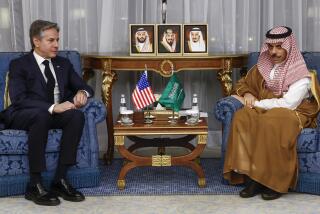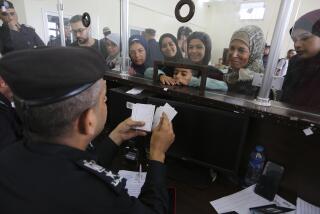Shultz Decides Against Trip to Mideast : Peace Prospects Called Dim; Secretary Will Visit Southeast Asia
- Share via
WASHINGTON — Secretary of State George P. Shultz has concluded that the prospects for peace in the Middle East are so dim that it would be pointless for him to visit the region this month.
Shultz’s decision, made after an intense two-week study, became clear Wednesday when the State Department announced that he will travel to Southeast Asia next week but will bypass the Middle East. Department spokesman Bernard Kalb said that Shultz will leave Washington on June 20 for a 10-day trip to Hong Kong, Singapore, Brunei, the Philippines and the Palau Islands.
Talks Contemplated
Administration officials said earlier that Shultz was contemplating an effort to revive the Mideast peace process and repair U.S. relations with the countries of the region. On May 30, Shultz said he would visit the area if his intervention would result in “even the tiniest increment of progress” in relations between Israel and its Arab neighbors.
Thus, by announcing that Shultz will not visit the Middle East either before or after the Southeast Asia trip, spokesman Kalb acknowledged in effect that there is no opportunity for even slight progress in the stalled peace process.
Administration officials said earlier that Shultz might try to mediate a final settlement to the dispute between Israel and Egypt over Taba, a half-mile-wide strip of beach between the Egyptian Sinai and the Israeli town of Eilat that is claimed by both countries. But preliminary talks on that issue apparently have broken down.
Shultz has been reluctant to engage in the type of shuttle diplomacy that former Secretary of State Henry A. Kissinger used in the early 1970s to secure agreements separating Israeli military forces from the armies of Egypt and Syria or the sort of intense personal involvement employed by former President Jimmy Carter to mediate the Israel-Egypt peace treaty.
Shultz Visit Urged
But the Israeli government of Prime Minister Shimon Peres urged Shultz to visit the region, and several Arab states have suggested that the United States raise the level of its involvement in the area.
Last month, White House spokesman Edward P. Djerejian said that a Shultz trip was “in the planning stage,” and Shultz said the matter was “being evaluated, intensely, just now.” As recently as Tuesday, however, U.S. officials said no decision had been made.
Apparently a frosty meeting between President Reagan and Jordan’s King Hussein helped tip the scales against greater U.S. intervention. Asked about U.S.-Jordan relations, Kalb referred to “the disappointments of recent months.”
In an interview with the Washington Post published Wednesday, Hussein complained bitterly about congressional pressure that caused the Administration in January to abandon plans to sell $1.9 billion in advanced fighter aircraft and missiles to Jordan and prompted Reagan to drastically scale back an arms package for Saudi Arabia. He said the restrictions were “very hard to swallow.”
More to Read
Sign up for Essential California
The most important California stories and recommendations in your inbox every morning.
You may occasionally receive promotional content from the Los Angeles Times.













